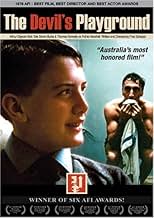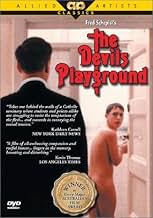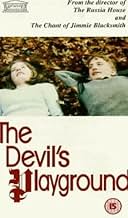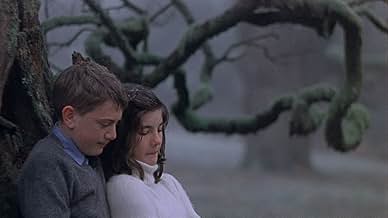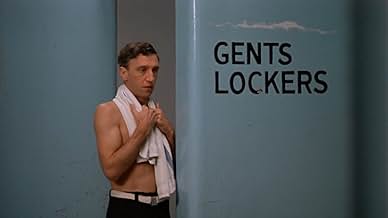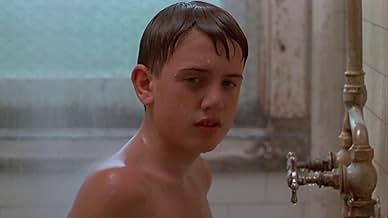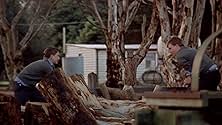The Devil's Playground
- 1976
- 1h 47min
CALIFICACIÓN DE IMDb
6.8/10
1.4 k
TU CALIFICACIÓN
Agrega una trama en tu idiomaFred Schepisi's first feature is this lushly photographed period drama detailing a young boy's coming-of-age in a strict Catholic seminary in 1950s Australia.Fred Schepisi's first feature is this lushly photographed period drama detailing a young boy's coming-of-age in a strict Catholic seminary in 1950s Australia.Fred Schepisi's first feature is this lushly photographed period drama detailing a young boy's coming-of-age in a strict Catholic seminary in 1950s Australia.
- Premios
- 6 premios ganados y 5 nominaciones en total
- Dirección
- Guionista
- Todo el elenco y el equipo
- Producción, taquilla y más en IMDbPro
Opiniones destacadas
There's one piece of inspired casting: Tom Kenneally (who looks like a jolly monk) as the visiting priest who looks like a jolly monk. Kenneally isn't an actor. (He's an Australian writer, best known overseas as the author of "Schindler's Ark", retitled "Schindler's List" in the US.) In fact, a non-actor suits the part well: like Kenneally, the priest arrives at the school performing his priest act competently but without polish. Like Kenneally, his native charm shines through, even when he's giving an appalling speech about Hell. You find yourself wondering: is he REALLY serious? And you have no way of telling.
That's all that's truly inspired about Schepisi's film. The story takes place at some kind of young-priests-to-be training college, only for a long time it looks as though there is no story at all: instead we get slice after slice of life, and it's a while before we can tell all the characters apart and work out which ones we're meant to be following. Telling a story in this way requires razor precision; every single scene must be inherently interesting AND perfectly crafted. No scene (with one possible exception) is. On the other hand, no scene really falls down, either. This is the kind of reasonably absorbing movie (after the initial boring bits) that's well worth the time it takes to watch - i.e., an hour and a half. (And it's even worth the time spent thinking about afterwards.) There's a difference between satisfaction and pleasure; a film like this is satisfying, and ... well, not UNpleasant. If only the title didn't promise something BIG.
That's all that's truly inspired about Schepisi's film. The story takes place at some kind of young-priests-to-be training college, only for a long time it looks as though there is no story at all: instead we get slice after slice of life, and it's a while before we can tell all the characters apart and work out which ones we're meant to be following. Telling a story in this way requires razor precision; every single scene must be inherently interesting AND perfectly crafted. No scene (with one possible exception) is. On the other hand, no scene really falls down, either. This is the kind of reasonably absorbing movie (after the initial boring bits) that's well worth the time it takes to watch - i.e., an hour and a half. (And it's even worth the time spent thinking about afterwards.) There's a difference between satisfaction and pleasure; a film like this is satisfying, and ... well, not UNpleasant. If only the title didn't promise something BIG.
Fred Schepisi's debut film was semi autobiographical in it's narrative and entirely grand in it's vision. It was able to be convincing in it's re-creation of the mid 50's catholic lifestyle disguised as education. Fred Schepisi has gone on to become renowned director and all indications of this were present in this debut.
One of my best friends at university had attended a Catholic brothers' seminary and like Fitz in "The Devil's Playground" had been dismissed from it due to his increasing interest in the opposite sex. Like Tom, he was confronted with letters sent to him from a girl he had met on a camp that the brothers had read and found disturbing. When my friend saw "The Devil's Playground" back in 1976, he commented that the film was realistic except for the fact that many of the lines spoken in the film would have remained in the minds of the brothers and the boys but never spoken.
The film itself is a masterpiece. The casting is perfection from that of the brothers down to the most minor characters. Watch for Danee Lindsay as Lynette. She has very few minutes on screen but her charm and warmth jumps off the screen at you. When she steals a kiss from Tom, she steals one from the audience. This is no sexually precocious 13 year old. This is a genuine 1950's Australian lass right down to her crooked front tooth that somehow adds to her appeal. How sad when Tom's innocently affectionate letters to her are used as evidence of something almost distasteful and to be discontinued lest Tom jeopardize his vocation. Tom Keneally as Father Marshall is equally effective. Again a small role that hits a home run. He is a cheerful and good man but this only makes his terrifying speech prior to the three day retreat even more disturbing. His depiction of hell, its terrors and its time span have remained with me – an atheist – throughout my life. If it remains with me, I can only guess at the effect it had on boys like those in the film.
The cinematography and the score add to the pervasiveness of the unease. There are very few shocks – just a sense of something being off kilter. Here is a struggle against an inexorable psychological enemy not some visible monster that jumps out of the shadows. Tom Allen, the young protagonist, struggles to remain positive about becoming a brother in the face of fanaticism, sadism, overly strict prohibitions and the onset of puberty with its embarrassments and confusion. When he finally runs away, there is a true sense of relief for him and for us as we have become involved in his struggle. What a wonderful performance by the young Simon Burke.
The struggles of all the brothers are presented in a balanced manner. Each of them is likably human and each, with the exception of Brother Francine, struggles with their belief in the rules and regulations they enforce. Even Brother Francine, as played by Arthur Dignam, plays a beautifully solemn piano piece which seems to reflect a sensitive side to an ostensibly repellent character. His fanaticism is indicative of his fear that any doubt might bring about a complete breakdown of his beliefs. And once he does doubt, the floodgates do open and all is lost.
Having taught teenagers for over 30 years, I have come to understand how much childhood stays with us throughout the rest of our lives. It makes me wonder whether Tom would ever be truly free from guilt. "Give me a boy until he is seven, and he is mine for life." What a terrible boast to make but an accurate observation of how enduring is childhood indoctrination.
The film itself is a masterpiece. The casting is perfection from that of the brothers down to the most minor characters. Watch for Danee Lindsay as Lynette. She has very few minutes on screen but her charm and warmth jumps off the screen at you. When she steals a kiss from Tom, she steals one from the audience. This is no sexually precocious 13 year old. This is a genuine 1950's Australian lass right down to her crooked front tooth that somehow adds to her appeal. How sad when Tom's innocently affectionate letters to her are used as evidence of something almost distasteful and to be discontinued lest Tom jeopardize his vocation. Tom Keneally as Father Marshall is equally effective. Again a small role that hits a home run. He is a cheerful and good man but this only makes his terrifying speech prior to the three day retreat even more disturbing. His depiction of hell, its terrors and its time span have remained with me – an atheist – throughout my life. If it remains with me, I can only guess at the effect it had on boys like those in the film.
The cinematography and the score add to the pervasiveness of the unease. There are very few shocks – just a sense of something being off kilter. Here is a struggle against an inexorable psychological enemy not some visible monster that jumps out of the shadows. Tom Allen, the young protagonist, struggles to remain positive about becoming a brother in the face of fanaticism, sadism, overly strict prohibitions and the onset of puberty with its embarrassments and confusion. When he finally runs away, there is a true sense of relief for him and for us as we have become involved in his struggle. What a wonderful performance by the young Simon Burke.
The struggles of all the brothers are presented in a balanced manner. Each of them is likably human and each, with the exception of Brother Francine, struggles with their belief in the rules and regulations they enforce. Even Brother Francine, as played by Arthur Dignam, plays a beautifully solemn piano piece which seems to reflect a sensitive side to an ostensibly repellent character. His fanaticism is indicative of his fear that any doubt might bring about a complete breakdown of his beliefs. And once he does doubt, the floodgates do open and all is lost.
Having taught teenagers for over 30 years, I have come to understand how much childhood stays with us throughout the rest of our lives. It makes me wonder whether Tom would ever be truly free from guilt. "Give me a boy until he is seven, and he is mine for life." What a terrible boast to make but an accurate observation of how enduring is childhood indoctrination.
Fred Schepisi's Australian drama from 1976 is a semi-autobiographical quite straightforward movie about the life and growing pains of both Fathers, Brothers and boys at a Roman Catholic boarding school, in 1953. Within Australia, it is considered amongst the top 50 films ever made there.
There are as many personal dilemmas and demons in the Brother's lives as there are in the boy's. Probably more. For someone who is not a Catholic, for me there's always the ever overpowering lecturing on sins of the flesh and such, particularly pertinent with pubescent boys, of course.
However, taking this aside and concentrating on the characters and the individual stories, these are solidly interesting and, thank goodness, the script is suitable for the 15 certificate, so there is no blushing at the natural use of grubby schoolboy banter.
There was also a slightly surprising amount of nudity, the strongest scene of which comes as a dream by one of the Brothers. The acting is uniformly very good, all natural, both boys and adults.
Radio Times said that The Devil's Playground 'takes us no further into the issue than a legion of others have before' and whilst I've far from seen them all, I'd have to agree.
Best bet buying the DVD is the Australian Cinema collection vol 1, a 12 film boxset and that is exactly where I got and saw my copy from.
There are as many personal dilemmas and demons in the Brother's lives as there are in the boy's. Probably more. For someone who is not a Catholic, for me there's always the ever overpowering lecturing on sins of the flesh and such, particularly pertinent with pubescent boys, of course.
However, taking this aside and concentrating on the characters and the individual stories, these are solidly interesting and, thank goodness, the script is suitable for the 15 certificate, so there is no blushing at the natural use of grubby schoolboy banter.
There was also a slightly surprising amount of nudity, the strongest scene of which comes as a dream by one of the Brothers. The acting is uniformly very good, all natural, both boys and adults.
Radio Times said that The Devil's Playground 'takes us no further into the issue than a legion of others have before' and whilst I've far from seen them all, I'd have to agree.
Best bet buying the DVD is the Australian Cinema collection vol 1, a 12 film boxset and that is exactly where I got and saw my copy from.
This was a very thought provoking film for me and after several years I'd love to see it again (I've seen it twice on TV). The young hero was so natural I felt I knew him, and he had a very likable personality. The two monks in mufti enjoying a night on the town were more down to earth and likable than most of the other monks at the Catholic boarding school and after successfully picking up two women in a pub they got cold feet! It was interesting to see how another monk who seemed very emotionally cold dealt with a trip to a mixed gender public swimming baths, and the amazing erotic dream he had afterwards. The subjects of troubled adolescence and religious repression were well explored. The film hasn't dated at all. I hope someone brings this out on a DVD.
¿Sabías que…?
- TriviaThis picture was one of fifty Australian films selected for preservation as part of the National Film and Sound Archive of Australia's Kodak / Atlab Cinema Collection Restoration Project.
- Bandas sonorasThe Anniversary Waltz
(uncredited)
Written by Dave Franklin and Al Dubin (uncredited)
[sung at the picnic by the Allen family when they visit Tom at school]
Selecciones populares
Inicia sesión para calificar y agrega a la lista de videos para obtener recomendaciones personalizadas
- How long is The Devil's Playground?Con tecnología de Alexa
Detalles
- Fecha de lanzamiento
- País de origen
- Sitios oficiales
- Idioma
- También se conoce como
- Прибежище Дьявола
- Locaciones de filmación
- Productoras
- Ver más créditos de la compañía en IMDbPro
Taquilla
- Presupuesto
- AUD 300,000 (estimado)
- Tiempo de ejecución1 hora 47 minutos
- Mezcla de sonido
- Relación de aspecto
- 1.85 : 1
Contribuir a esta página
Sugiere una edición o agrega el contenido que falta

Principales brechas de datos
By what name was The Devil's Playground (1976) officially released in Canada in English?
Responda
